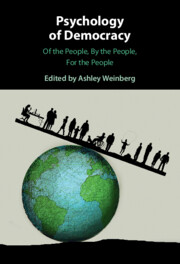Book contents
- Psychology of Democracy
- Psychology of Democracy
- Copyright page
- Contents
- Figures
- Tables
- Contributors
- Preface
- Acknowledgements
- Chapter 1 Psychology of Democracy
- Part I Of the People
- Part II By the People
- Chapter 8 Trust in Political Institutions and Support for Authoritarianism
- Chapter 9 New Technology, Language and Gesture in Contemporary Indian Political Discourse
- Chapter 10 Fact or Fiction
- Chapter 11 Dissecting the Psychology of a Voter
- Chapter 12 Building Trust through a Revolving Door of Leaders:
- Chapter 13 After the Party Is Over
- Part III For the People
- Index
- References
Chapter 13 - After the Party Is Over
from Part II - By the People
Published online by Cambridge University Press: 24 February 2022
- Psychology of Democracy
- Psychology of Democracy
- Copyright page
- Contents
- Figures
- Tables
- Contributors
- Preface
- Acknowledgements
- Chapter 1 Psychology of Democracy
- Part I Of the People
- Part II By the People
- Chapter 8 Trust in Political Institutions and Support for Authoritarianism
- Chapter 9 New Technology, Language and Gesture in Contemporary Indian Political Discourse
- Chapter 10 Fact or Fiction
- Chapter 11 Dissecting the Psychology of a Voter
- Chapter 12 Building Trust through a Revolving Door of Leaders:
- Chapter 13 After the Party Is Over
- Part III For the People
- Index
- References
Summary
The chapter briefly reviews the limited literature from the UK and wider afield on the loss of political office. It considers the key themes that emerge from the literature from a psychological and a sociological perspective, including the author's empirical research with former elected politicians, their partners and current politicians. In this research, there was not a simple division between those who had stepped down voluntarily and those who had been defeated. Most former politicians, whether they had chosen to go or not, had grieved their loss of political office, acknowledging that the emotional impact had been more complex than anticipated. The key task for individuals was to find a new narrative about who they were and what they did; how to structure the vast amount of time that had suddenly opened up; and to come to terms with no longer mattering to others in the same way. The chapter goes on to explore the impact of losing political office for partners, families, employers and wider civic society. The chapter concludes on a cautionary note about the implications of not addressing how problematic political exit can be, for representative democracy and for us all as citizens.
- Type
- Chapter
- Information
- Psychology of DemocracyOf the People, By the People, For the People, pp. 286 - 304Publisher: Cambridge University PressPrint publication year: 2022

